Pope Sixtus IV founded a brothel with the funds of the papal treasury. He also took tribute from Roman prostitutes, becoming a monopolist on the prostitution market.
“Even if it is contrary to divine teaching, it does not mean that what is gained is therefore wrong. The condition of the prostitute is dishonorable, not her earnings. The Church, therefore, has the full right to accept her alms, "argued the legality of the church's income from the harlotry of St. Thomas Aquinas. 200 years later, one of Christ's governors showed how much he took these words to heart.
St. Thomas Aquinas became a moral consent to a practice that the Church - it would seem - should be combating. In the meantime, long before the norm was the absence of the church's condemnation of fornication . Prostitution was treated as something completely normal and even necessary for the proper functioning of society. It was even supposed to protect the women and girls of good homes from male lust.
Debauchery permitted by law
Many theologians of that time considered it even less evil when a woman persuaded her husband to seek the services of a prostitute than if she were to consent to sexual behavior considered grave sins, such as anal or oral sex. Moreover, priests and religious were willing to use such services themselves. And this is in the light of the law established by him. The Synod of Constance in 416 forbade ... onanism among the clergy. He did not see anything wrong with having sex - as long as "it is approached knowing that it is a simple and, in fact, degrading physiological activity."
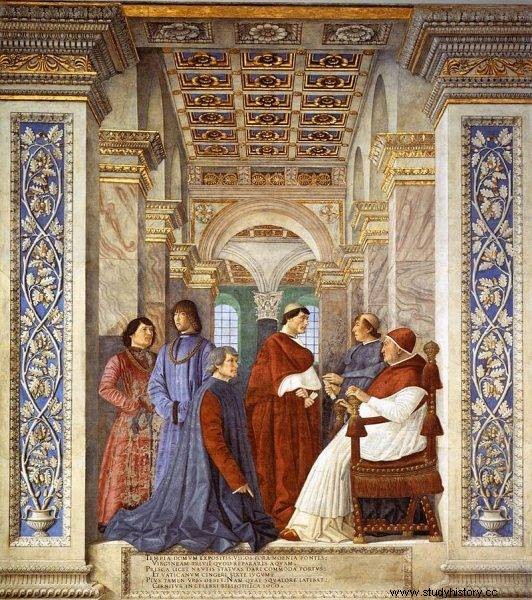
Sixtus IV founded a brothel with the papal treasury.
No wonder then that the pious activity of the Fathers of the Church soon led to the fight against onanism through the courageous use of the dynamically developing brothels in Europe. Both lay and… consecrated. There was no secret of the existence of brothels run by nuns . As if that were not enough, clergy struggling with the urges could also avail themselves of the sexual services of some nuns, something Petrarch himself lamented. On the other hand, in 1033, Pope Benedict IX, immersed in debauchery, allowed the establishment of lupanar in the Eternal City. And right next to one of the churches.
Pimp on the throne of Peter
These efforts of church hierarchs, however, seem to pale in the face of the actions of elected by the conclave in 1471, Sixtus IV . For he not only adored the lecherous company of women and men - which in fact did not differ from his predecessors, such as John XII or Clement VI - but also went even further in this matter. He founded a brothel with the funds of the papal treasury. Its female and male staff were taxed heavily. With pilgrims constantly coming to Rome (who came to the city on the Tiber not only for spiritual nourishment), it generated huge profits for the Pope.
He did not stop there, however, and ordered a tribute to be levied on all other Roman houses of pleasure and even on ladies and gentlemen who did not belong to the guild . Thus, the pimp Pope became a monopoly in the harlot market.
Reformer?
Previously, there was no indication that Francesco della Rovere, born in 1414 in an impoverished noble family, would be engaged in such a wicked occupation. Moreover, his exceptional oratory skills were quickly recognized in the Franciscan Order to which he was sent by his mother. He was delegated to study theology. Thanks to his wonderful sermons and numerous doctrinal treatises, he quickly gained fame and respect.
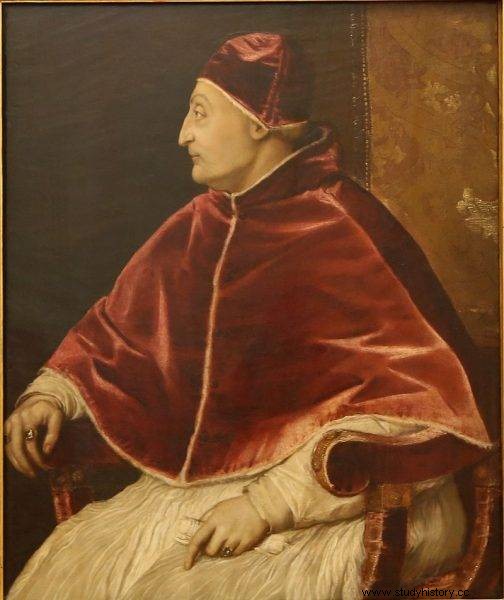
On August 9, 1471, he was proclaimed Pope (admittedly with a minimal majority of votes) as Sixtus IV
The future pope in disputes with the Dominicans commanded, inter alia, Immaculate Conception of Mary and Jesus. He argued that the birth of saintly persons could not be determined by such an indecent act as intercourse in the flesh . It was - according to Francesco - still an act of sexual immorality. Even when it took place between the spouses. This attitude earned him the reputation of the undisputed guardian of morality . No wonder then that when he was proclaimed Pope (albeit with a minimal majority of votes) as Sixtus IV on August 9, 1471, this fact was received with enthusiasm. Especially in circles calling for the moral renewal of the Church. The new pope, as if fulfilling the hopes placed in him, even signed the so-called election capitulation . In it, he undertook to convene an ecumenical council and to put an end to nepotism.
However, it soon became clear how naive the enthusiasts of the new pope were in their expectations. Indeed, in the first years of his pontificate, for example, he tried to fulfill his obligations regarding the crusade against the Turks. The initial successes of the papal fleet over the Muslims were even optimistic. However, when there were failures, and the attempts to involve the Grand Duchy of Moscow in the fight against the Saracens failed, the Pope's crusade fervor clearly weakened. At that time, a completely different matter seemed to be on his mind. And it wasn't really a matter of the promised council or the fight against nepotism.
Family, oh family…
Church historians often emphasize the honesty and strength of faith of the new pope. By the way, however, they seem to forget that he was an extremely… family man. It is suspected that he had a dozen so-called nephews and nephews. For some of them were to be the fruit of Sixtus' debauchery - even with their own sister . However, it was customary in those times children from the papal bed were adopted by their closest relatives in order to preserve the appearances of morality . Six of these nephews soon became cardinals by the distinguished uncle, and one of them would later receive the papal tiara as Julius II.
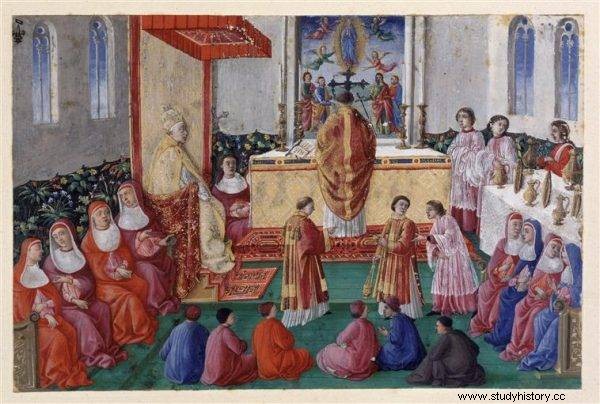
Sixtus seemed to have no equal in his care for his own fortune.
In this specifically understood fight against nepotism, Sixtus also cared for other family members. He connected them in marriages with the most important families of Italy. In this way, he seemed to realize his vision of creating a true monarchy out of the Papal State, led by lay and clergy dignitaries related to the Pope.
New word creator
These efforts entailed enormous costs that traditional Church revenues were unable to cover. Even the opening of the lupanar and the taxation of fornication could not provide a sufficient cash flow . Sixtus therefore introduced the compulsory offering of gifts to His Holiness by everyone who received even the tiniest papal favors.
Under the watchful eye of a pupil who despises the wealth of the Franciscans, the previously known but now perfected procedure of selling offices in the papal surroundings . For the representatives of wealthy Roman families, there was no price they would not pay to pave the career path for their sons. And it did not matter that for the needs of the papal treasury the offices were duplicated and performed sine cura , that is, without the efforts of the official. In this way, Sixtus IV - whether we like it or not - enriched not only his treasury with a few tons of gold, but also modern vocabulary with the term sinecure .
Income Diversification
In his thrift and concern for his own fortune, Sixtus seemed to have no equal. He may have run out of money, but he has never run out of ideas to earn it. The profits from fornication and sinecures were quickly joined by ducats from the sale of indulgences for the dead and - protecting against lightning, fires and death in childbirth - figurines of lambs, the production of which was exclusive. He also invented the sale of the bodily privilege of comforting temporarily single married women as well as a fee paid by priests with mistresses. Sixtus did not hesitate to agree, for the appropriate amount, to sodomy in the family of one of the cardinals. However, only in June, July and August (!).
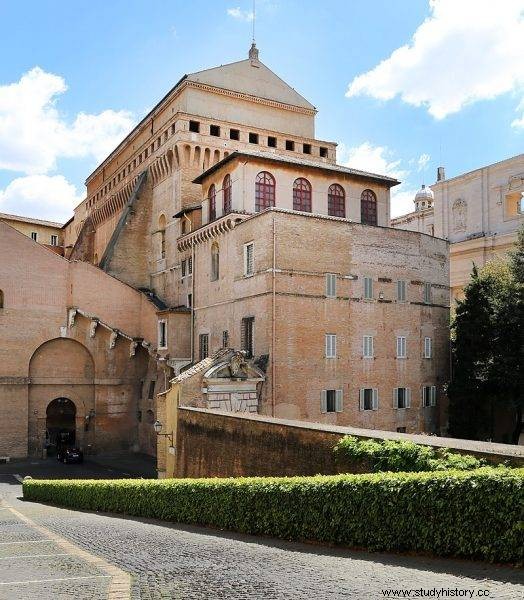
Sixtus IV funded, inter alia, Sistine Chapel
The culmination of his pursuit of the golden calf was the case of the Spanish Inquisition. Sixtus, in 1482, granted the subordinates of the rulers of Spain (Ferdinand of Aragón and Isabella of Castile), suspected of cryptojudaism, the right to appeal against the judgments of cruel inquisitors - whose activities he had agreed to four years earlier. However, the pope was not after a sense of justice, but about the large sums paid by the appellants.
Although the pontificate of Sixtus IV was dominated by secular affairs, he did not completely neglect his spiritual duties. In 1475, he presided over the solemn celebrations of the jubilee year. He strongly promoted Marian devotion by establishing the feast of the Immaculate Conception of the Blessed Virgin Mary on December 8. He founded new churches in Rome and generously supported mendicant orders - especially the Franciscans.
Over my dead body!
However, Sixtus's chief element was temporal matters. Unfortunately, in their efforts to create a dynastic state, the Pope and his proteges often got involved in unnecessary armed conflicts. In 1478, Sixtus with great hopes became involved in the Pazzi conspiracy, i.e. the coup in Florence. It was to bring the fall of the Medici and handing over power in the city to the papal nephew of Girolamo Riario. The conspiracy, however, did not work out, causing a two-year war that only strained the Vatican's treasury. Until today, the only memento of this conflict is the Swiss Guard whose origins are traced back to the agreement concluded by Sixtus with the authorities of several Helvetic cantons on the permanent recruitment of local volunteers to the papal army.
The lack of tangible benefits from that war soon prompted the pope to unleash another one - first with Ferrara and Naples, and then with Venice. This time, although at one point he offered a plenary indulgence for killing every Venetian, he did even worse. Although when he learned about the peace treaty signed in August 1484 without his consent, he did not want to acknowledge it. In his rage, he even had to shout: "Peace with Venice ?! Over my dead body! ” . The next day (August 12), after receiving this news, his heart could not stand the agitation and the papal wish was satisfied.
And yet damned
The pursuit of wealth and carnal enjoyment meant that even in quite liberal Rome in this respect, Sixtus did not enjoy much popularity . Not surprisingly, his apartments were thoroughly robbed after his death. Even the bed on which the pope's body lay and his wardrobe fell victim to the thieves. The deceased could only count on grief from his family, artists and scientists, whom he never regretted a penny.
It must be admitted that Sixtus IV devoted a large part of the proceeds from his financial activities to great works of culture and architecture. Thanks to his efforts, Rome became a pearl of the Renaissance. It was here that the masters of the era gathered:Botticelli, Perugino and Pinturicchio, who decorated the Sistine Chapel founded by him and named after him. . The Pope became, inter alia, for the construction of the Ponte Sisto (also from his name), which enjoys the eye to this day - the first bridge in the Eternal City since antiquity - and the Via Sisto, i.e. the road connecting the Castle of St. Angel's Basilica with St. Peter.
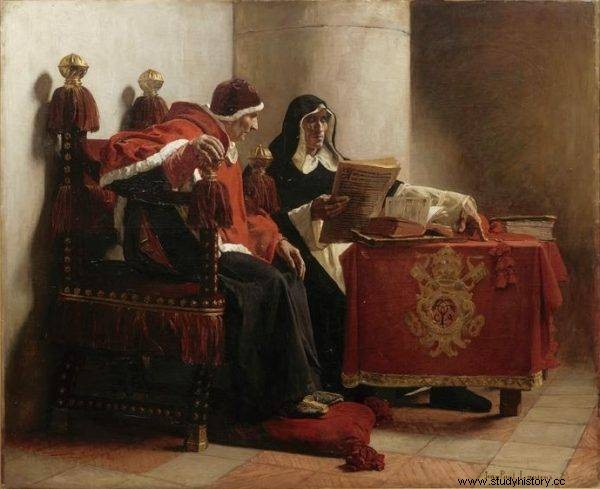
The Pontificate of Sixtus IV is assessed very negatively
He took care of the development of the Vatican Library (the first full list of the library's collections was then compiled), and by making his collection of ancient sculptures available (including the famous Wolf ), gave rise to the Capitoline Museums. He was also mindful of science, allowing autopsies - something extraordinary at that time.
Undoubtedly, the merits for the development of culture and science did not change the very critical assessment of the pontificate of Sixtus IV. Wonderful buildings, beautiful paintings or rich book collections could not obscure the secularization and moral decay of the Roman curia. On the other hand, Machiavelli wrote about Sixtus himself:"This Pope was the first to prove how much power he has at his disposal and how many matters that later turned out to be wrong can be hidden under the guise of papal authority."
